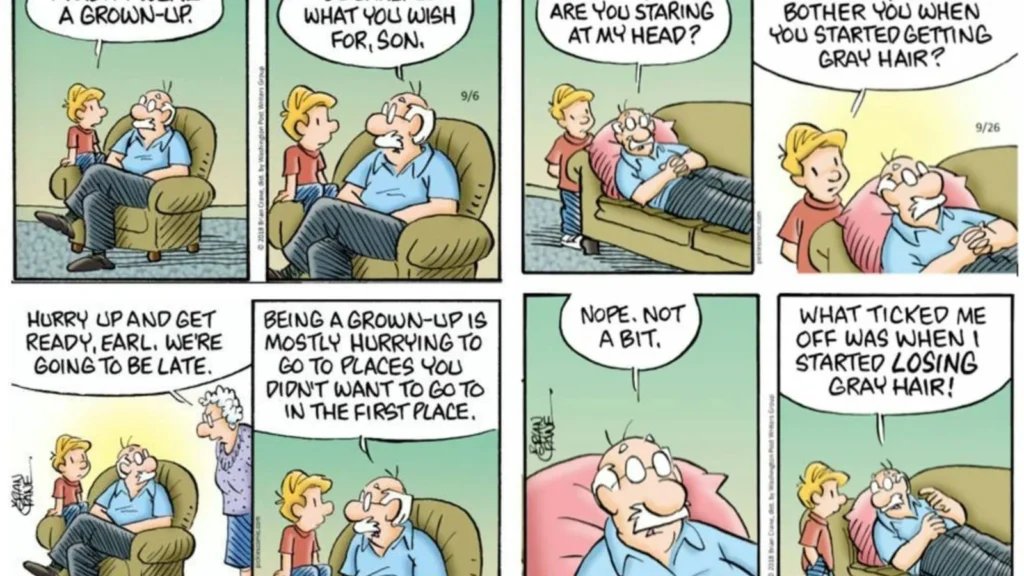Pickles Comic: Breaking Stereotypes About Senior Citizens
Challenging Ageist Assumptions in Popular Media
The Pickles comic stands as a revolutionary force in how senior citizens are portrayed in popular culture. While mainstream media often reduces elderly characters to one-dimensional stereotypes – the grumpy old man, the sweet grandmother, or the confused senior – the Pickles comic presents Earl and Opal as complex, multifaceted individuals with rich inner lives, ongoing dreams, and dynamic personalities.
This groundbreaking approach in the Pickles comic has helped shift public perception about what it means to age in America. Rather than viewing seniors as burdens or objects of pity, the strip portrays them as valuable contributors to society who continue to grow, learn, and adapt throughout their golden years. This positive representation has had far-reaching effects on how younger generations view their own aging process.
Seniors as Technology Adapters
Beyond the “Confused by Technology” Trope
One area where the Pickles comic particularly excels is in its nuanced portrayal of seniors and technology. While the strip acknowledges that Earl and Opal sometimes struggle with new devices and digital platforms, it avoids the tired trope of elderly people being completely helpless with technology. Instead, the Pickles comic shows them as capable learners who may approach technology differently but can ultimately master new tools when properly motivated.
The comic demonstrates that technological challenges aren’t unique to seniors – they’re universal human experiences that become more pronounced with rapid technological change. By presenting these situations with humor rather than condescension, the Pickles comic helps readers understand that adaptation is a lifelong process, not a generational failure.
Innovation and Problem-Solving
The Pickles comic frequently showcases Earl and Opal’s creative problem-solving abilities, proving that wisdom and experience often triumph over pure technical knowledge. Whether they’re finding unconventional solutions to household problems or navigating social situations with finesse, the characters demonstrate that seniors bring valuable perspectives and innovative thinking to modern challenges.
Physical Aging Without Losing Dignity
Realistic Health Challenges
Unlike many portrayals of aging that either ignore health issues entirely or exaggerate them for dramatic effect, the Pickles comic strikes a perfect balance in addressing the physical realities of growing older. The strip acknowledges that Earl and Opal face certain limitations – whether it’s Earl’s hearing difficulties or Opal’s occasional aches and pains – without defining the characters solely by these challenges.
The genius of the Pickles comic lies in showing how the couple adapts to physical changes while maintaining their sense of humor and dignity. They don’t become their ailments; instead, they find ways to work around limitations and continue enjoying life fully.
Active Lifestyle and Engagement
The Pickles comic consistently portrays its senior characters as active participants in life rather than passive observers. Earl and Opal engage in hobbies, maintain social connections, and pursue interests that bring them joy. This representation challenges the stereotype that retirement means withdrawal from meaningful activity.
Emotional Complexity and Growth
Ongoing Personal Development
Perhaps the most revolutionary aspect of the Pickles comic is its portrayal of seniors as individuals who continue to evolve emotionally and psychologically. The characters face new challenges, reconsider old beliefs, and sometimes change their perspectives based on new experiences. This contradicts the common assumption that people become set in their ways as they age.
The comic shows Earl and Opal learning from their mistakes, adapting their communication styles, and growing closer as a couple even after decades of marriage. These storylines demonstrate that personal growth doesn’t end at any particular age – it’s a lifelong journey.
Dealing with Loss and Change
The Pickles comic handles difficult topics like the loss of friends, changing family dynamics, and mortality with remarkable sensitivity. Rather than avoiding these realities of aging, the strip addresses them head-on while maintaining hope and resilience. This approach helps readers understand that acknowledging life’s challenges doesn’t mean surrendering to despair.
Impact on Intergenerational Understanding
The success of the Pickles comic in breaking down stereotypes has contributed to better intergenerational relationships. Younger readers gain insight into the experiences and perspectives of older adults, while older readers feel validated and represented in popular culture. This mutual understanding fostered by the Pickles comic has helped bridge generational divides and promote more respectful, nuanced conversations about aging in our society.
